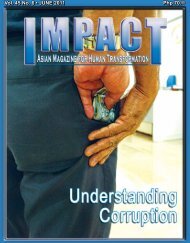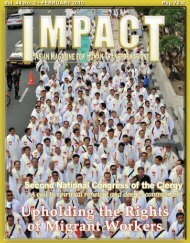Php 70.00 Vol. 47 No. 07 • July 2013 - IMPACT Magazine Online!
Php 70.00 Vol. 47 No. 07 • July 2013 - IMPACT Magazine Online!
Php 70.00 Vol. 47 No. 07 • July 2013 - IMPACT Magazine Online!
Create successful ePaper yourself
Turn your PDF publications into a flip-book with our unique Google optimized e-Paper software.
COVER<br />
STORY<br />
employee except for a just cause.” 5<br />
Further, the Philippine Constitution<br />
also guarantees security of tenure for<br />
employees. The guarantee of security of<br />
tenure under the Constitution means that<br />
an employee cannot be dismissed from<br />
the service for causes other than those<br />
provided by law and only after due process<br />
is accorded the employee. 6 It has been also<br />
settled that even if probationary employees<br />
do not enjoy permanent status, they are<br />
accorded the constitutional protection of<br />
security of tenure. This means they may<br />
only be terminated for just cause or when<br />
they otherwise fail to qualify as regular<br />
employees in accordance with reasonable<br />
standards made known to them by the<br />
employer at the time of their engagement. 7<br />
Employers, local and transnational,<br />
however have gotten away defying Philippine<br />
labor laws. The Department of<br />
Labor has neither clout nor guts to address<br />
this crime. Capital makes billions<br />
each quarter. And the great irony is, the<br />
contractual workers who are creating all<br />
those billions of net profit live below subsistence<br />
level. A study by the International<br />
Labor Organization found that the rate of<br />
“contractualization” is now at 70% of the<br />
Philippine workforce. Almost every large<br />
company depends on contractual workers<br />
to get the day’s business done.<br />
The government guidelines on subcontracting<br />
must protect the interests of<br />
both capital and labor. In fact, when most<br />
companies’ net profit amounts to millions<br />
or billions every year, the contractual<br />
minimum wage laborer who bleeds and<br />
sweats to create billions of profit for his<br />
employer, is left with not enough to eat.<br />
The contractual agency also grabs a slice<br />
from the employee’s daily minimum wage<br />
as administrative fee. 8<br />
Laborem Excercens<br />
Ultimately, contractualization of labor<br />
is not only illegal and unconstitutional but<br />
more so immoral as it goes against the social<br />
teaching of the Church. The encyclical<br />
Laborem Excercens of Pope John Paul II<br />
evidently indicates that full employment<br />
is a basic human right of a laborer.<br />
We must first direct our attention<br />
to a fundamental issue: the question of<br />
18<br />
<strong>IMPACT</strong> <strong>•</strong> <strong>July</strong> <strong>2013</strong>

















